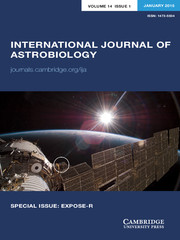Article contents
The navigation of biological hyperspace
Published online by Cambridge University Press: 11 November 2003
Abstract
A recurrent argument against the reality of biological evolution is the claim that there is insufficient time for the emergence of biological complexity. Such a view is a staple of creation ‘scientists’, but even cosmologists and biochemists have been overheard murmuring similar sentiments. Certainly the stock response, that the scientific evidence for evolution is overwhelming, must be made. However, it is also the case that whilst the efficacity of natural selection is not in dispute, it is context-free and fails to explain the specificities of life. This observation is usually greeted with a Gallic shrug: ‘Yes, the biosphere is very rich, but so what?’ Indeed, the standard scientific response is that evolution is dogged by contingent happenstance, with the implication that a given complexity, say intelligence, is an evolutionary fluke. This, however, is inconsistent with the ubiquity of evolutionary convergence. Here I outline the argument for such convergence providing a ‘road-map’ of possibilities that arguably has universal applications and as importantly points to a much deeper structure to life.
Information
- Type
- Research Article
- Information
- Copyright
- © 2003 Cambridge University Press
- 15
- Cited by

